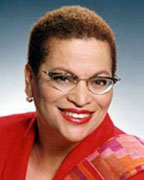
Is ‘Big Brother’ racially biased?
By Julianne Malveaux
When George Orwell wrote the novel 1984, he envisioned a character, real or imagined “Big Brother” who was a know-all, see-all, omnipotent and elusive presence that intruded into lives because he could. Those who knew about “him” were told that they did not exist, but in many ways, Big Brother may not have existed, either. The omnipotence had taken on a life of its own.
Orwell’s book was a book ahead of its time. At a different time, his book could have been dismissed as psychedelic fantasy. Today, he is just a step behind the reality in which we live. Verizon is sharing telephone records. The Department of Justice is monitoring journalists, and the IRS is playing games with those who seek nonprofit status. People pulled over for a minor traffic violation will have to submit fingerprints to find out if they have broken other laws. Big Brother is alive and well in too many layers of our lives.
Meanwhile, market researchers are segmenting populations by zip code and consumer patterns. They can tell you what percentage of whites; African Americans or Latinos live in a certain zip code. They can tell you what you earn, what you are worth, and how many of your neighbors have criminal records. The zip code data drives marketers. Does it also drive law enforcement?
A recent study indicated that African Americans are between 2 and 6 percent more likely to be arrested for marijuana violations than whites. I guess it is easier to arrest from a corner than from a country club! The rate of arrests for marijuana possession is 716 per 100,000 for African Americans, compared to 192 per 100,000 for whites. The disparity is much higher in some counties.
Does this mean that African Americans are breaking more laws, or that law enforcement officers are targeting some zip codes or communities more regularly? It is a lot easier to pick up a few citizens enjoying marijuana in a park than banging down the doors of an elite country club. Yet data about marijuana usages suggests that there is little to distinguish the habits of African Americans from those of whites. The only difference is the arrest rate.
Big Brother knows.
Big Brother has driven the kind of demographic that will tell you where you can find low-income, highly unemployed individuals, regardless of race. Big Brother can tell you who can afford lawyers and who cannot. Big Brother can drive police to investigate the least and the left out, those who are most vulnerable, while deciding to allow others to slink behind their space of class and privilege. Big Brother can play bang for buck games that make it more profitable to arrest those with few resources in the hood instead of those with home-based protection.
Data collection seems to be a race-neutral process. While data collection is an input, arrests are an output. Between input and output there is the opportunity for racial bias to show up. If white folk and Black folk take an equal toke, why are Black folk more likely to be arrested? Are zip codes driving public safety officers to one place and deterring them from another?
Differences in marijuana arrests raise real questions about the many ways that data may be used to discriminate. Instead of structural racism, intrinsic racism, and other forms of racism, we now have a data-based racism that is only logical when we ask how data is collected. Simply put, the zip code data leads people to discriminate, if only because they are being led to single out a certain population.
In other words you can be a non-racial racist. You can let the data, warped though it may be, lead you to biased conclusions. Data-based racism is as corrosive as emotion-based racism. Big Brother’s racial biases is nothing more than par for the course.
